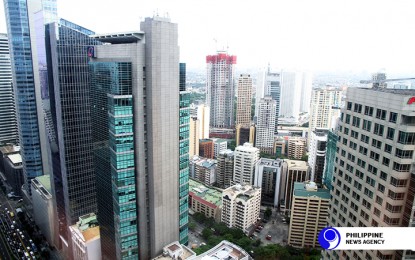
MANILA – Real interest rates in the Philippines are in negative territory after monetary officials aggressively cut the central bank’s key policy rates by 200 basis points to spur lending and cushion the impact of the pandemic.
To date, the Bangko Sentral ng Pilipinas’ (BSP) overnight reverse repurchase (RRP) rate is at a record low of 2 percent.
The banks’ reserve requirement ratio (RRR) has been cut by as much as 200 basis points and banks’ lending to micro, small, and medium enterprises (MSMEs) has been allowed for a certain period in compliance with reserve requirements.
All these were aimed at encouraging lending and ensuring that economic activities remained active despite the movement restrictions put in place to thwart the rise of coronavirus disease 2019 (Covid-19) infections.
The BSP also entered into a PHP300 billion short-term repurchase deal with the national government and extended a PHP540-billion provisional advance to boost the government’s cash holdings and boost its capacity to finance pandemic-related financing.
With all these measures, BSP Governor Benjamin Diokno said they are ready to use more tools to ensure the recovery of the domestic economy.
“Looking ahead, the BSP remains committed to deploying its full range of instruments as needed in (the) fulfillment of its mandate to maintain price and financial stability conducive to growth,” Diokno said.
Thus, economists are one in citing the central bank’s contributions to cushion the economic impact of the pandemic.
However, they also recognized measures instituted by the Department of Finance (DOF), despite its cautiousness to spend.
“It’s not easy to be Superman, they say. This 2020, the BSP, I would say, tried to be just that, the savior of the Philippine economy,” Union Bank of the Philippines (UnionBank) chief economist, Ruben Carlo Asuncion, told the Philippine News Agency (PNA).
Asuncion said the Philippine central bank “did all it can do within its current mandate.”
“Although it still has space to move and accommodate further, but I guess they are ready if the economy continues to be stuck in low gear,” he said.
Relatively, Asuncion said, the government continues to have fiscal space amid the increased pandemic-related spending, which happened a year after it experienced a delay in the approval of the national budget.
“I understand that (the) government wants to be prepared for a long game, but it is also prudent to be ahead of the game,” he added.
Banco de Oro (BDO) chief market strategist Jonathan Ravelas agreed that the central bank did more than what was expected of it in response to the pandemic.
“It is more aggressive among other Asian central banks. It has been very accommodative,” he told PNA, citing the BSP’s statement that it continues to have more tools that it could tap once needed.
On the government’s pandemic-related spending, Ravelas said it continues to show the DOF’s balancing act of fiscal spending while ensuring that fiscal prudence stays.
“It tries to address the pandemic and live within their target. They are trying to show that they are trying to manage (the situation),” he said.
With all the challenges stemming from the pandemic, Ravelas said the Philippines is facing the same storm as other countries but on a different boat.
“We are able to manage,” he said, noting that interest rates remain low, the stock market has risen to above 7,000 after dropping to about 4,000 when the pandemic hit the country last March, the peso continues to strengthen and is now trading at the PHP48 level to the US dollar.
Despite the economic contraction since the first quarter of the year, Ravelas said the domestic economy remains stable.
“It(‘s) just that we need to re-open,” he said.
The BDO economist said it is understandable for investors’ confidence to be fragile given the pandemic, thus, what the government needs to show is to efficiently manage the situation.
Confidence largely relies on vaccine deployment and rollout, he said, citing the need for the government to increase information on preventive measures, such as physical distancing, the use of face masks and face shields, and regular washing of hands to ensure that cases remain low.
An increase in the government’s infrastructure budget is also needed to encourage more investors to conduct business in the domestic economy, Ravelas added.
Similarly, Rizal Commercial Banking Corp. (RCBC) chief economist, Michael Ricafort, said the cuts in the BSP rates this year made government-issued bonds the best “in terms of price gains at some point, especially when local government bond prices gained to new record highs around July to August 2020.”
“Bond prices eased by about 3 percent and bond yields higher by about 0.30 to 0.40 from record lows since then (the third quarter),” Ricafort said.
“This has resulted (in) sharp reduction of borrowing costs/financing costs in the local economy, thereby helping spur greater demand for all types of loans for businesses, consumers/households, and other institutions, all of which stimulate more investments, jobs/employment, and greater business/economic activities that help improve economic recovery prospects.”
He said the BSP’s move to ease regulatory requirements for banks’ lending to MSMEs and its decision to defer tighter capital regulations allowed banks to increase lending activities.
The central bank’s increased government security purchases also boosted domestic liquidity that resulted in a drop in bond yields and borrowing costs.
“Going forward, further monetary easing cannot be ruled out in the coming weeks/months as the economy needs all the support measures that it could get in view of the economic challenges largely brought about by the Covid-19 pandemic, as monetary easing is expected to do more of the heavy lifting amid the limited funds for fiscal/economic stimulus measures,” Ricafort added. (PNA)
